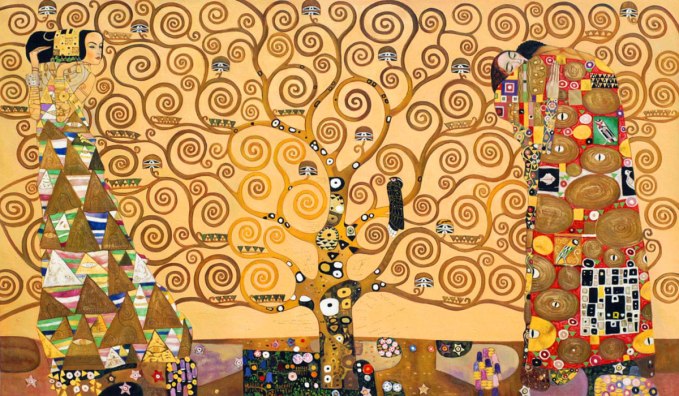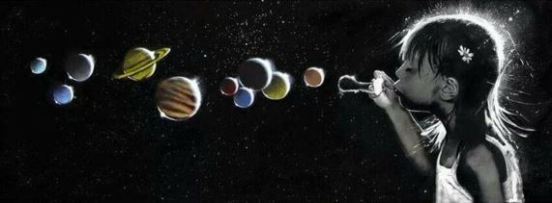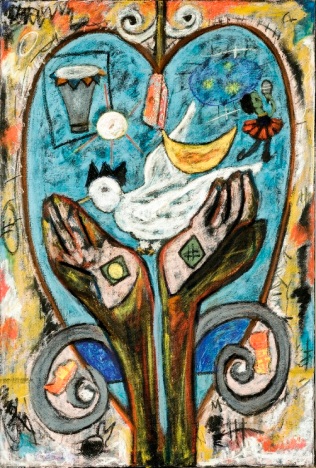
Fr Aidan has a nice review of the (Thomistic) classical position on God’s relatedness to the world. I’d like to pick out a portion of it for comment. He summarizes:
Of every being and of the universe as a whole we may ask why? but of the One who is the answer to that question, why? may not be asked. It may not be asked because God can only be the answer if he lacks all the features of finite being that raises the question to begin with. And that, I think, is what actus purus effectively means. God is the infinite plenitude, fullness, and perfection of being and thus the ultimate and final explanation for why finite beings exist. He does not contain potentiality, because that potentiality would in turn evoke the metaphysical question. Potentiality requires the action of another agent to bring it to fulfillment. A rubber ball cannot realize its potency to bounce unless someone throws it against a wall; a stick of butter cannot realize its melting potential unless someone spreads it on a hot slice of toast. “Potency does not raise itself to act,” explains Thomas; “it must be raised to act by something that is in act” (SCG I.16.4). If God were not the infinite actualization of existence, then not only would we find ourselves wondering “Why does God exist instead of nothing?” but so would God! We might even imagine Deity as enduring an eternal existential crisis: “Why do I have all of this unfulfilled potential?”
There’s a lot to agree with here. I like the explanatory approach centered on asking ‘why?’ and seeking answers that explain our actual experience (including our finitude, temporal becoming, aesthetic appetite, consciousness, etc.). ‘Why’ is an intuitive and clarifying question, and Aquinas understood (as did all Christian thinkers before him) that neither any particular thing in the universe, nor the material cosmos as a whole, is sufficient to account for why there is anything at all rather than nothing. Given the nature of created becoming, some explanation is required – some reality that is its own reason for being, not requiring an explanation for its existence from outside itself, a self-sufficiently transcendent reality that explains both itself and all else – i.e., God.
We can and must ask ourselves ‘why?’ of God as well. But with God we get a different answer because a God capable of answering why the material-sentient universe exists without begging the question of his own existence is unlike the universe in profound ways. Where the ‘why?’ question asked of the universe derives its answer outside itself, God – properly understood – is the answer to his own ‘why?’. In this sense every sane theist agrees with Aquinas. It is a point I have urged open theists to explore at greater depth with seriousness and an open mind.
 One could (and probably ought to) for the sake of argument ask whether the cosmos itself can be its own explanation. After all, if theists can posit God as uncreated and self-sustaining, let’s just suppose (as Carl Sagan asked us to) that the universe is self-sustaining and exists necessarily. Why multiply explanations beyond necessity?
One could (and probably ought to) for the sake of argument ask whether the cosmos itself can be its own explanation. After all, if theists can posit God as uncreated and self-sustaining, let’s just suppose (as Carl Sagan asked us to) that the universe is self-sustaining and exists necessarily. Why multiply explanations beyond necessity?
By all means, one ought to explore this option. We won’t do that here, but it’s been done at great length by others, and we agree the cosmos does not give evidence of being self-sufficient/self-sustaining. My comments here are directed to theists who already grant this and who agree that God is the world’s transcendent creator.
The question that continues to be debated today by some, and which we here are most interested in, is: What sort of relations might a transcendently self-sufficient God have with the world he creates and knows? Certainly there would be a certain asymmetrical relation. That’s already entailed in God’s being the end-of-the-line sort of answer to our question ‘why?’. God explains why there is anything at all rather than nothing. Creation does not, however, explain why there is a God. Obviously, a non-mutual relation obtains: God creates and sustains the world, gives it being, and explains why it is at all. The world cannot explain God in any such respect.
For some, this is all there is to say about the manner of relations that might obtain between God and the world. However, while divine aseity (as self-sufficient transcendence) is true and essential, many don’t feel that it follows that God “does not contain [any conceivable] potentiality.” The reason some, like me, think this doesn’t follow is because it doesn’t seem that all potentiality evokes the specter of a mover other than the agent. We can imagine the realization of unrealized potential in God which does not require that God, like created beings grounded in him, “be moved” by a power outside himself. In our view it is false, as Fr Aidan argues (following Aquinas), that “[all p]otentiality requires the action of another agent to bring it to fulfillment.” That rule would follow for created beings certainly, but it’s conceivable, we think, that some potentialities (namely, divine potentialities) may be self-sufficiently motivated and actualized from within, freely and contingently.
Examples that demonstrate Aquinas point with respect to creatures are innumerable. Fr Aidan describes a few – rubber balls, sticks of butter, etc. With respect to created entities, Aquinas has to be right when he says “Potency does not raise itself to act; it must be raised to act by something that is in act.” But does it follow that a self-sufficient reality (God) – a reality whose essence is self-sufficient act – cannot be thought to have any unfulfilled potentiality since it must them be dependent upon something outside itself to raise any supposed potency to actuality?
It depends on the potency. If we mean a self-constituting potential, then God would require some reality already in act to bring his potential to fulfillment, and obviously we do not want to say that. But not all unfulfilled potentiality need be self-constituting. Potential may be self-expressive and not self-constituting. We think there are good reasons to suppose, given the existence of the kind of world we live in, that God is more than necessary (i.e., God transcends his own necessity), and as such his essential, antecedent, triune actuality both determines the scope and nature of his potential for self-expressive acts and that this antecedent actuality is the only realized ‘act’ we need to reference in explaining the movement of such potentiality to actuality.

Such contingency in God would be of a peculiar kind. It would realize self-expressive, not self-constitutive, potential, and it would do so unlike created potentialities which require ‘being moved’ by some actuality other than God. There seems no a priori reason to suppose that a God self-sufficient to explain why the world is at all could not himself possess unrealized potentialities for a contingent expression extrinsic to the necessary plenitude of his essential triune act, and that these potentialities would require nothing outside this plenitude to raise them to actuality. Like the classical tradition, God would not be subject to finite, created becoming (he would not become a mere ‘god’ who requires a mover other than himself), but unlike the classical tradition God would possess potential for duration without loss, duration that includes contingent, gracious, wholly self-expressive relations.
Would those relations with the world be “real”? If ‘real’ relations are defined as relations that affect or determine what a thing is essentially, then I’m happy to say God is not so affected by his relations with the world, because I do not suppose God to be essentially affected by us. But if ‘real’ relations are defined simply as relations one truly has (i.e., relations that involve one in acts of mind and will vis-à-vis what one is related to) but which remain extrinsic to what one is essentially, then I’m fine with positing God’s real relations with the world. Does this commit me to a notion of divine simplicity unacceptable to classical theists? I’d be surprised if it did not. I know these terms (“real” for example) have long established meanings and many are loath to adjust/expand meanings and vocabulary to accommodate new insights. I don’t have any pretenses about affecting the conversation at that significant a level. I confess, I’m more interested in working out my own salvation with fear and trembling.
Jesus, Savior, Son of God, have mercy on me a sinner.
 I’m just thinking through the metaphysics of being and becoming. It’s not something I’ll ever finish (pun intended). For the moment I’d like to express temporal becoming in Process terms because I think in some respects PT articulates ‘becoming’ fairly well (even if Process has no real concept of transcendence).
I’m just thinking through the metaphysics of being and becoming. It’s not something I’ll ever finish (pun intended). For the moment I’d like to express temporal becoming in Process terms because I think in some respects PT articulates ‘becoming’ fairly well (even if Process has no real concept of transcendence). (5) Even if we posit a necessary God-world relationship in PT fashion, or even a necessary God-series/of/worlds relationship as Oord does (though his ‘series’ reduces to a single world), it’s still the case that non-divine reality cannot provide God subjective aims for God’s becoming, nor can a God who is irreducibly temporal provide himself his own subjective aims for his own future, for possibilities by definition are what a thing is not yet but which it may become. Thought through consistently, it follows that not only can nothing other than God provide an irreducibly temporal God of becoming the “subjective aims” or “end” for his own becoming, but neither can such a God be his own subjective aim, for no merely temporal God can be in the present an actuality sufficient to offer itself possibilities to become what it is not.
(5) Even if we posit a necessary God-world relationship in PT fashion, or even a necessary God-series/of/worlds relationship as Oord does (though his ‘series’ reduces to a single world), it’s still the case that non-divine reality cannot provide God subjective aims for God’s becoming, nor can a God who is irreducibly temporal provide himself his own subjective aims for his own future, for possibilities by definition are what a thing is not yet but which it may become. Thought through consistently, it follows that not only can nothing other than God provide an irreducibly temporal God of becoming the “subjective aims” or “end” for his own becoming, but neither can such a God be his own subjective aim, for no merely temporal God can be in the present an actuality sufficient to offer itself possibilities to become what it is not.
 Interesting. Jesus felt healing power leave him. My question is this: Was there less healing power available on account of power “leaving” Jesus? Was the healing virtue present in Christ partially depleted or used up on account of having “left” him? Is that divine relation some scarce commodity that gets used up as our needs spend it in acquiring the healing we seek? Obviously not. What then? Power really left, but it also really didn’t make a difference. It left in one sense, and didn’t leave in another. There’s a real relation, a real going out of divine power to heal, but no determination of measurable loss in return. The relation can be known ‘in its going out’ without being known ‘as a going out’ (i.e., as a lessening of itself). We might liken all of creation, and God’s changing knowledge of and within it, as ‘interest’ paid out into and as creation on an immeasurable ‘principal’. Creation enjoys the interest but never spends the principle, and there is real expenditure even if no loss of principle.
Interesting. Jesus felt healing power leave him. My question is this: Was there less healing power available on account of power “leaving” Jesus? Was the healing virtue present in Christ partially depleted or used up on account of having “left” him? Is that divine relation some scarce commodity that gets used up as our needs spend it in acquiring the healing we seek? Obviously not. What then? Power really left, but it also really didn’t make a difference. It left in one sense, and didn’t leave in another. There’s a real relation, a real going out of divine power to heal, but no determination of measurable loss in return. The relation can be known ‘in its going out’ without being known ‘as a going out’ (i.e., as a lessening of itself). We might liken all of creation, and God’s changing knowledge of and within it, as ‘interest’ paid out into and as creation on an immeasurable ‘principal’. Creation enjoys the interest but never spends the principle, and there is real expenditure even if no loss of principle.
You must be logged in to post a comment.